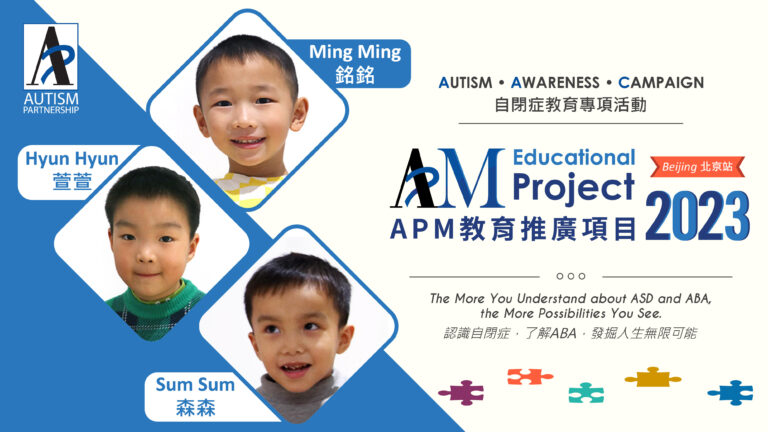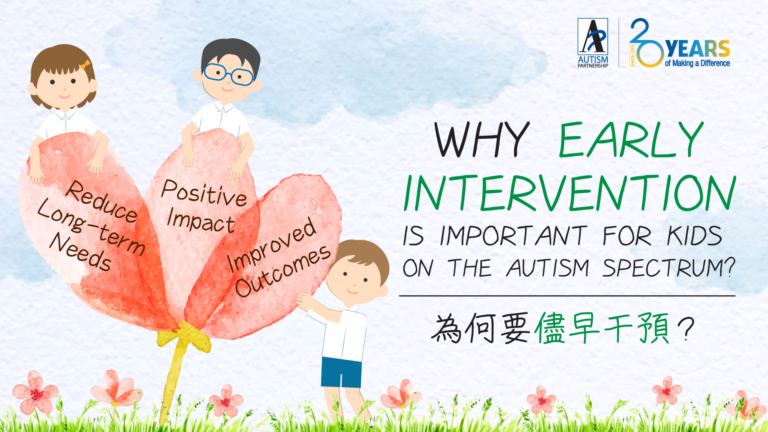
April is World Autism Awareness month. Throughout the month, people around the world focus on sharing stories and providing opportunities to increase understanding and acceptance of people with autism, fostering worldwide support. Let’s see what people in Hong Kong know about Autism and what YOU know about Autism.
Autism is characterized by deficits in social communication and social interactions and restricted, repetitive patterns of behavior, interests, or activities. It can be associated with several other features, Including language impairment.
Individuals who have Autism are born with the condition, although the age at which the symptoms become apparent vary. Its cause is predominately genetic, and there is no evidence vaccines are a factor.
In general, individuals with Autism look like anyone else. They may standout in certain situations due to behavioral differences.
The most effective treatment is High-quality intensive behavioral therapy, received at a young age.
There is no medical test that can reveal whether or not somebody has ASD. There are some observational tools that have some validity, though typically the diagnosis is made by a professional Who is skilled in autism assessment.
In the old days, people were usually not diagnosed with ASD until they made it to school. Then it became more common for diagnosee to be made by the age of three. But nowadays, the diagnosis can be made as early as 18 months and some signs can be identified by as early as 6 months.
While individuals with ASD must have social deficits and certain behavior patterns, there is no symptom that all individuals with ASD have. For example, deficits in eye contact are quite common, but are not universal.
Individuals with autism spectrum disorder really are on a spectrum. There are people who demonstrate obvious impairment, individuals who are indistinguishable from typically developing people and everything in between. Beliefs that individuals with ASD all have lower IQs, don’t talk, or socially disinterested are quite common. But the reality is that most people with ASD do not have those traits.
While ASD is a life-long condition, the extent to which symptoms persist depends upon many factors, including level of cognitive impairment. However, with high-quality early intensive intervention, the degree to which symptoms persist can be significantly reduced or eliminated in some individuals.
ASD is a condition that, by definition, begins in childhood. However, some individuals, especially those who are more mildly impacted, may not be diagnosed until adulthood![]() Do you think individuals with ASD would want to have social interactions?
Do you think individuals with ASD would want to have social interactions?
For sure nearly all individuals with ASD want to have social interactions. Their level of interest and how they express it may be different from how typical people express their interest and the interactions they want to have may be atypical in one way or another; however, there is no doubt that interest is there.
Individuals with ASD can hold a range of competitive jobs. However, individuals with ASD tend to be underemployed. In other words, if they are employed, they tend to be employed at levels below their skill set. There are various reasons for this dynamic, including people with ASD having difficulties with social networking, job interviewing, and so on. These challenges speak to the need for holistic intervention at all ages that does not focus solely on traditional academic curricula and prioritizes social development and learning how to learn skills.
Dr. David Fischer received a doctoral degree in Clinical Psychology from Rutgers University, USA, advised by Dr. Sandra Harris. Since 1999, he was worked in the field of Applied Behavior Analysis and with individuals diagnosed with a developmental disability. He completed his pre-doctoral internship and post-doctoral fellowship at the Marcus Institute in Atlanta, Georgia working in the severe behavior unit, short-term-out-patient clinic, feeding disorders unit, and early intervention clinic. From 2007 – 2011, he trained public school teachers to instruct and manage the behavior of their students diagnosed with Autism spectrum disorder. He also was the clinical coordinator of the Asperger’s College Program, which provides support services to Rutgers students diagnosed with Asperger’s Disorder.

Every little life is a special present for a family. From the time a baby is born, parents journey through lots of highs and lows, wishing for their child to grow up with a big smile, make great friends, find their own way in a job they love, and create a happy family. However, for […]

Parenthood is a journey filled with unexpected twists and turns, challenges, and moments of profound joy. For Adam’s father, the discovery that his son, Adam, was on the autism spectrum marked the beginning of a unique chapter in their lives. This is the story of a father’s realization, acceptance, and the unconditional love and strength […]

Autism Spectrum disorder can be diagnosed as early as 18 months. Research shows strong evidence on how effective Applied Behavior Analysis (ABA) can help children with Autism. It helps to deal with children’s challenging behaviors such as inattention, aggression, self-stimulation, etc. Howard, et al (2005) conducted a study to compare the effectiveness of 3 treatment […]
Please share to let more people learn about ASD and ABA therapy:
AP holds the belief that with quality Autism Partnership Method (APM) treatment, individuals with autism should reach their fullest potential and achieve the greatest degree of independence and highest quality of life possible.
Sign up now to get ABA and Autism related news delivered to your inbox. Enter your email to get started
Hong Kong Center
Kowloon Center

All information received will always remain confidential. We will contact you as soon as we review your message. Thanks